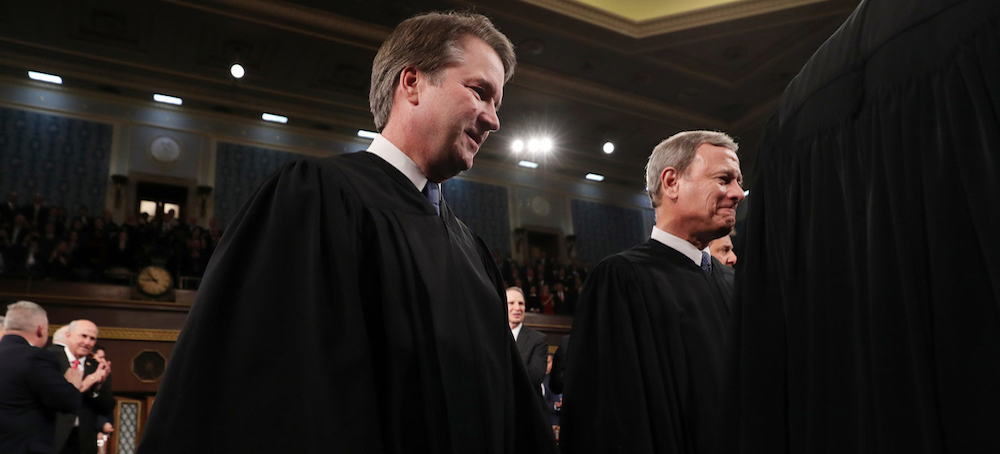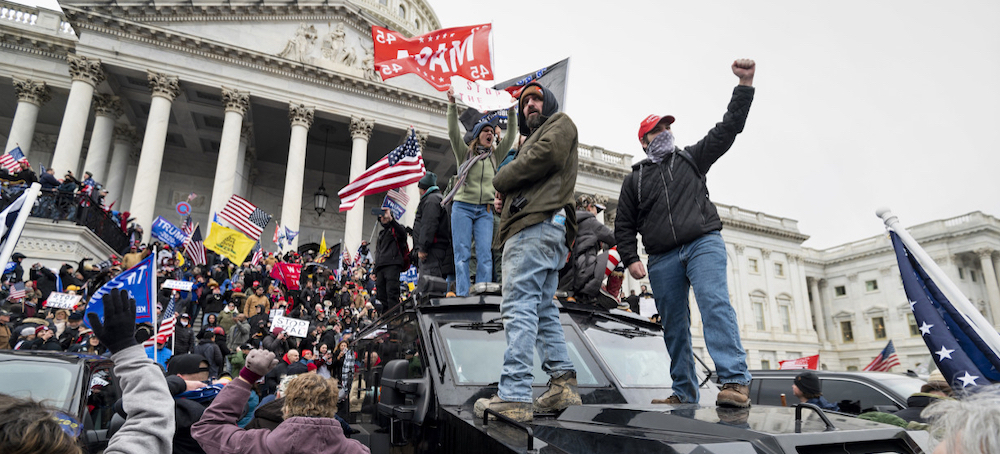Live on the homepage now!
Reader Supported News
For decades, Thomas has had a deeply pessimistic view of the country, rooted in his reading of the Fourteenth Amendment. After the Supreme Court’s recent opinions, his dystopia is becoming our reality.
Insiders have long known that Thomas is the right’s pacesetter on the Court, laying out positions that initially seem extreme yet eventually get adopted. For years, Thomas pulled Justice Antonin Scalia—even, on occasion, Justice Anthony Kennedy and Chief Justice William Rehnquist—to the right on issues of crime and punishment. His opinions on campaign finance, once seen as recklessly deregulatory, now command a majority. In 1997, Thomas signalled his belief that the Second Amendment protects an individual’s right to bear arms, a fringe position that the Court would come to accept, eleven years later, in District of Columbia v. Heller. Even Thomas’s extraordinary claims, in a concurring opinion three years ago, about the racist foundations of abortion and birth control, found their way into a footnote in the Court’s recent abortion decision.
Despite this track record of stealth and success, liberals have often dismissed Thomas as stupid or a sellout, a patsy and a puppet, the Justice who cannot speak. That era is over. Yet Thomas’s significance far outstrips his captaincy of the Court’s war on liberalism. The most powerful Black man in America, Thomas is also our most symptomatic public intellectual, setting out a terrifying vision of race, rights, and violence that’s fast becoming a description of everyday life. It’s no longer a matter of Clarence Thomas’s Court. Increasingly, it’s Clarence Thomas’s America.
Like so much else in this country, the largeness of Thomas’s vision hinges on the smallest of claims: two clauses, all of thirty-eight words, in the second sentence of the Fourteenth Amendment. One is the due-process clause, which Thomas believes has been misread. In Thomas’s view, that misreading is a stain on the nation—and the reason for its fall.
The due-process clause, which prohibits the state from depriving anyone of “life, liberty, or property, without the due process of the law,” is the basis for the constitutional right to contraception, same-sex sexual conduct, same-sex marriage, and, until a few weeks ago, abortion. To some, it might seem strange that the clause contains an affirmative right to anything. Doesn’t it simply require that the state declare the law, set out a punishment for violating the law, charge a suspect for its violation, try him in court, and so on? That, as it happens, is Thomas’s view.
But there’s a second, more expansive, interpretation of the clause, which holds that certain rights are so intrinsic to “liberty,” so fundamental to what it means to be free, that they may never be abridged without a vital reason. It’s not enough for the state to dot its “i”s and cross its “t”s before it takes those rights away. The state should not take them away at all—unless it must. Among those rights is privacy, from which derive the rights to contraception and so on.
Most liberals and conservatives accept some version of this second interpretation—which is called “substantive due process”—but argue over which rights it protects. Liberals say abortion; conservatives say guns. Thomas rejects the entire idea of substantive due process. In his concurrence in Dobbs v. Jackson Women’s Health Organization, which overturned Roe v. Wade, Thomas calls substantive due process an “oxymoron” and a “legal fiction.” The due-process clause “guarantees process” only. Because it “does not secure any substantive rights,” he writes, “it does not secure a right to abortion.” The same goes for birth control, same-sex sexual conduct, and gay marriage.
Thomas’s argument against substantive due process is more than doctrinal. It’s political. In a speech before the Federalist Society and the Manhattan Institute which he gave in his second year on the Court, Thomas linked a broad reading of the due-process clause, with its ever-expanding list of “unenumerated” rights, to a liberal “rights revolution” that has undermined traditional authority and generated a culture of permissiveness and passivity. That revolution, which began with the New Deal and peaked in the nineteen-sixties, established the welfare state, weakened criminal law, and promulgated sexual freedom. The result has been personal dissipation and widespread disorder. Workers lose their incentive to labor. Men abandon wives and children. Criminals roam and rule the streets.
Today, the left ties itself into knots over whether it should defend sexual minorities, dismantle the carceral state, or fight for social democracy. For Thomas, these are three fronts of the same war. To reverse the downward spiral of social decadence and patriarchal decay, conservatives must undo the liberal culture of rights, starting with the unenumerated rights of substantive due process.
Thomas has never made a secret of his belief that the rights revolution hit Black people especially hard, destroying the Black patriarch whom Black women, children, and communities need for protection and instruction. “The salvation of our race,” he declared in 1985, depends upon “the strength and the will of black men.” But welfare “takes your manhood away,” as his grandfather told him. Sexual freedom takes husbands and fathers away, he told the students at a Black college in Savannah. Liberal criminal-justice policies take sons and brothers away: “The people who will suffer from our lofty pronouncements,” he writes in a dissent from a liberal Court opinion defending the rights of gang members, are those who live in Black neighborhoods. Because of their vulnerable position in American society, Black people have the greatest need of the stern patriarchal authority from which self-discipline and communal strength derive. Black fathers must become “the lion of children’s safety” and “the sheep of their peace.”
If misreading the due-process clause has caused the dissolution of Black men, another part of the Fourteenth Amendment offers their rehabilitation. For Thomas, the privileges-or-immunities clause, an obscure and mostly discarded provision that he has sought to resurrect for decades, promises the restoration of both his community and the country.
The privileges-or-immunities clause has its roots in the battle over slavery and emancipation. Before the Civil War, many Americans, particularly Southern slaveholders, argued that the Bill of Rights applied only to the federal government, leaving the states free to deny basic rights like the freedom of speech. With the privileges-or-immunities clause, which declares that “no State shall make or enforce any law which shall abridge the privileges or immunities of the United States,” the authors of the Fourteenth Amendment hoped to abolish the distinction between the rights of national and state citizenship. From now on, all Americans, especially Black Americans, would enjoy fundamental rights and freedoms—“privileges or immunities”—which would be secured by the federal government. “No general assertion of human rights can be of any practical value,” Frederick Douglass declared, while “there remains such an idea as the right of each State to control its own local affairs.”
A persuasive argument, but it was never accepted. In a series of cases during Reconstruction and its aftermath, the Court gutted the meaning of the privileges-or-immunities clause, forcing later activists and lawyers to rely upon the equal-protection clause and the due-process clause to advance the claims of Black people, women, and queer people. Thomas believes that this was a crucial mistake, and that the Court’s precedents on the privileges-or-immunities clause should be revisited. The clause “gives us a foundation for interpreting not only cases involving race,” he writes, “but the entire Constitution and its scheme of protecting rights.”
Lest we think that Thomas imagines anything like the rights that contemporary liberals defend, he made clear, in Saenz v. Roe (1999), that his interpretation of the privileges-or-immunities clause would protect only a narrow range of rights. Abortion is not one of them; neither is same-sex marriage. But he does include the right to bear arms, which he views as the right that precedes all others. Citing Justice Joseph Story, Thomas calls the right to bear arms “the palladium of the liberties of a republic.”
Liberals often claim that there is something hypocritical, if not perverse, about conservatives enshrining the right to bear arms without enshrining the right to abortion. Conservatives have an easy response: one right is found in the Constitution, both as tradition and text; the other is not. That’s what Justice Samuel Alito argues in Dobbs and in his concurrence, the day before, in New York State Rifle & Pistol Association, Inc., et al. v. Bruen, which struck down part of New York’s concealed-carry law.
Bodily autonomy is so foundational to contemporary understandings of freedom, however, that it’s hard to imagine a reason for denying it to women other than the fact that they are women. The fetish for guns, meanwhile, can seem like little more than a transposition of America’s white settler past onto its white suburban present, a reading Alito suggests at the end of his concurrence in Bruen:
In 1791, when the Second Amendment was adopted, there were no police departments, and many families lived alone on isolated farms or on the frontiers. If these people were attacked, they were on their own. . . . Today, unfortunately, many Americans have good reason to fear that they will be victimized if they are unable to protect themselves. And today, no less than in 1791, the Second Amendment guarantees their right to do so.
It’s worth comparing this passage with Thomas’s reading of the right to bear arms. Alito argues that the Second Amendment can be enforced, over and above state law, because of the due-process clause. Thomas roots his justification in the privileges-or-immunities clause, and in its backstory of slavery and abolition. Not only does that free Thomas from Alito’s white frontiersmen of yore but it also allows him to conjure the history of Black slaves arming themselves against their masters, and of Black freedmen protecting their families during Jim Crow. In his concurring opinion in McDonald v. Chicago (2010), a landmark guns case, he concludes with this resonant image:
One man [in 1919] recalled the night during his childhood when his father stood armed at a jail until morning to ward off lynchers. . . . The experience left him with a sense, “not ‘of powerlessness, but of the “possibilities of salvation” ’ ” that came from standing up to intimidation.
Thomas tells some of this history in Bruen. He dedicates a paragraph to the horror Chief Justice Roger Taney expressed—in the infamous Dred Scott decision declaring that Black people, enslaved or free, were not citizens of the United States—at the prospect of Black citizens having the right “to keep and carry arms wherever they went.” Mocked and misunderstood on Twitter, the paragraph reprises a longer story, which Thomas narrates in McDonald, of how terrified whites were of Black slave revolts in antebellum America. Citing the work of Herbert Aptheker, the Communist author of a pioneering history of slave rebellions, Thomas notes that white fears of Black revolt would be “difficult to overstate.” Those fears “peaked” during Reconstruction, to which Thomas devotes even more attention in his McDonald and Bruen opinions.
If there is any rational basis to the Court’s claim that people have the right to carry guns because they fear violence at the hands of a generalized other, it is in Thomas’s account of Black arms and Black history. Of the four pro-gun opinions in Bruen, Thomas’s is the only one in which we find an empirical example of a people’s justifiable need for armed self-defense in the face of violent enemies and government indifference. “Seeing that government was inadequately protecting them” under Jim Crow, he writes, Black people took up arms “to defend themselves” against white terrorists. The only history that can make sense of the Court’s position on guns, in other words, is that of race war.
In his second year on the Court, Thomas said that he was “proudly and unapologetically irrelevant and anachronistic.” Almost thirty years later, he has become what conservatives of every era seek to be: anachronistic and relevant.
Under Thomas’s aegis, the Court now assumes a society of extraordinary violence and minimal liberty, with no hope of the state being able to provide security to its citizens. In his Bruen concurrence, Alito extends Thomas’s history of Reconstruction to all modern America: “Many people face a serious risk of lethal violence when they venture outside their homes.” Like the Black citizens of Reconstruction, he argues, few of us should expect the police to protect us. “The police cannot disarm every person who acquires a gun for use in criminal activity,” Alito writes, “nor can they provide bodyguard protection for [New York] State’s nearly 20 million residents.”
Once upon a time, Alito’s claims of systemic danger and state incapacity would have been dismissed as the rantings of a mountain survivalist. But, after decades of mass shootings, his assertion that the cops can’t protect you reads as a corollary to the left’s warning that the cops won’t protect you. What makes both beliefs plausible is the failed state that America has become, with no small amount of help from Thomas, the right-wing Court, and elected officials from both parties.
Today’s felt absence of physical security is the culmination of a decades-long war against social welfare. In the face of a state that won’t do anything about climate change, economic inequality, personal debt, voting rights, and women’s rights, it’s no wonder that an increasing portion of the population, across all races, genders, and beliefs, have determined that the best way to protect themselves, and their families, is by getting a gun. A society with no rights, no freedoms, except for those you claim yourself—this was always Thomas’s vision of the world. Now, for many Americans, it is the only one available.
Look up his classmates. Both Hillary Clinton and Robert Reich went to law school with him. Robert Reich recently commented and I can't easily locate the article, but he said Hillary was always asking questions, prepared to comment and Clarence Thomas was mostly silent.
There have always been suggestions that his admission was 'affirmative action' which explains his hatred of the provision. Read about his history. His family didn't have the $$$ to provide the education he received.
When he was head of EEOC, there were a lot of complaints about its failures and backups of complaints that you can surely find elsewhere.
excerpt:
"Thomas chaired the EEOC from 1982 to 1990. Journalist Evan Thomas once opined that Thomas was "openly ambitious for higher office" during his tenure at the EEOC. As chairman, he promoted a doctrine of self-reliance and halted the usual EEOC approach of filing class action discrimination lawsuits, instead pursuing acts of individual discrimination.[52] He also asserted in 1984 that black leaders were "watching the destruction of our race" as they "bitch, bitch, bitch" about Reagan instead of working with the Reagan administration to alleviate teenage pregnancy, unemployment and illiteracy.[53]"
https://en.wikipedia.org/wiki/Clarence_Thomas
Hillary Clinton Says Justice Thomas Was a ‘Person of Grievance’ and ‘Anger’ When They Were at Yale Law, Believes ‘Women Will Die’ as a Result
AARON KELLERJun 28th, 2022
In an appearance on CBS Mornings, former presidential candidate and Secretary of State Hillary Clinton (D) shared several of her personal opinions about Justice Clarence Thomas in the wake of the Supreme Court’s decision on Friday to overrule Roe v. Wade.
When asked by host Gayle King about Thomas’s concurring opinion to “reconsider past rulings on contraception and same-sex marriage,” Clinton verbalized her thoughts of Thomas dating back to the days they were both in law school.
“Justice Thomas has sort of floated this out there about contraceptive rights — contraception — and about same-sex marriages, but other justices have pushed back to say, no, he’s really sort of on his own with that,” King asked Clinton. “You don’t believe that?”
“He may be on his own, but he’s signaling — as he often did — you know, people — I went to law school with him,” Clinton answered. “He’s been a person of grievance for as long as I’ve known him. Resentment. Grievance. Anger. And he has signaled, ah, in the past to lower courts, to state legislatures — find cases, pass laws, get them up. I may not win the first, the second, or the third time, but we’re going to keep at it.”
“So you’re saying people people pay attention to this?” King continued in a clip from the broadcast posted online by CBS.
“Yes,” Clinton replied. “The people he is speaking to, which are the — you know — right wing, very conservative judges and justices and state legislatures. And the thing that is — well, there are so many things about it that are deeply distressing — but women are going to die, Gayle. Women are going to die.”
Clinton graduated from Yale Law School in 1973; Thomas graduated from the same institution in 1974.
Clinton’s comments stand in stark contrast to those of fellow SCOTUS Justice Sonia Sotomayor, who recently extolled Thomas’s virtues as a friend at a speech before a liberal legal group:
Justice Thomas is the one justice in the building that literally knows every employee’s name. Every one of them. And not only does he know their names, he remembers their family names and histories. He is a man who keeps — cares deeply about the court as an institution, about the people who work there, but about people. That’s why I can be friends with him and still continue our daily battles over our difference of opinion in cases.
Thomas has posited that so-called substantive due process — the legal theory that the word “liberty” in the Fourteenth Amendment is a wellspring of fundamental rights not fully articulated or described elsewhere in the Constitution — is “an oxymoron that lacks any basis in the Constitution.” He has suggested that some rights currently enshrined in the Court’s substantive due process might — or might not — find homes in other portions of the Constitution. That’s if future litigants prime the pumps of the judicial system and tee up the correct plaintiff and the correct facts for such a review.
Special Coverage: Ukraine, A Historic Resistance
READ MORE
Follow us on facebook and twitter!
PO Box 2043 / Citrus Heights, CA 95611








